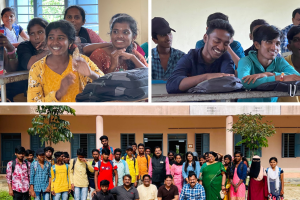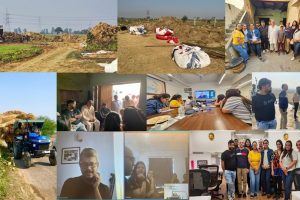If we have to achieve the goal of universal and quality primary education, we first have to reject the idea that there is a ‘’geography of poverty’’.
I see a difference between learning and schooling. Both are part of the continuum we call education. But schooling in India is often not quality. When we talk about “quality” education, we usually refer to a base level of rote learning across subjects but we are not looking at the kind of imaginative teaching that respects the curious and innovative mind of the child. We are concerned about schooling – textbooks, classrooms, exams and scores – but not so much about learning. Learning that happens through surround reading — storybooks, storytelling, day dreaming.
Studies show that early intervention has a huge developmental impact on a child and this is borne out by any education organization’s work on the ground. But most government and municipal schools do not have a preschool or some kind of an early years program.
We don’t need reading specialists in these schools; we need teachers who know how to teach reading; teachers who read themselves. If only every teacher could be a reading mentor. If only teaching reading were a subject in B.Ed and B.El.Ed courses. Our organization is hoping we can get there through dialogue and advocacy.
Many countries have solid and robust solutions to engage 0-10 year olds. But in India, the early learning landscape is dotted with well-meaning non-profits that are reinventing the wheel to a large extent. That is because we don’t collaborate and have no way of learning from each other.
Schools are not the only problem. Beyond schools, there is nothing in the immediate environments of children to stimulate them. In the more than 900 Delhi slums that we have worked in, none had libraries, playgrounds or other child-friendly spaces when we first went in. It’s almost like the Indian city had forgotten that there were children living in these marginalized communities. I wonder what the new “Smart Cities” are going to do for children? Keep them invisible because it suits us? Or help every child stand tall and be counted?
In the primary grades, there is nothing in the curriculum to get children to think freely and without constraints. There is no focus on topics such as Indian culture, tribal issues, global warming, and more. If we have to boost quality in education, we have to seriously rethink our classroom approach.
People believe that teacher competency is at the core of the problem. But you can’t change old teaching methods and habits overnight. When we implemented our StoryPedagogy™ and curriculum for LIFE across a number of government schools from 2012 to 2017, the impact was significant. Enrollment went up and teacher absenteeism went down significantly within a few months.
On the policy front, RTE was supposed to fix many of these issues. But the legislation was too little and too late. We should have put this in place in the 1950s. Now it works mostly as a bandaid solution that doesn’t completely cover or stick. With its emphasis on free and compulsory education, RTE diverts us from quality – from establishing creative and innovative spaces for children to learn and flourish. We have a glass ceiling, in our country, for children living in poverty. But once you give them room to grow, there are no limits to what they can achieve. RTE must address this.
I have met so many amazing kids through my work. I remember a preschooler in one of our schools. She was standing up on this stone slab with a pen in her hand, poised to write. Then she jumped off the slab to ask another child to help. Her friend drew a house on the board – the square kind with a triangle for a roof. Without missing a beat, she proceeded to draw a beautiful, multi-petal flower.This is creativity! If we continue to allow that girl to harness her creativity without hamstringing her with rules, there is no saying where she can go. For instance, in the schools we run, we talk a lot about dinosaurs in the classroom. Or about a friend on the moon who is celebrating her birthday. So what do you take with you? Water. Air. Trees. Sustainable frugality comes easy when we play with fantasy and story. That’s when children realize that Earth is a spaceship and we can’t be conspicuous spenders.
So, I have two basic but very important questions to ask of policy makers: 1) Why are children not reading? and 2) Why can’t they be exposed to BIG ideas that will help them be change agents?
To begin with, it is important to establish a clear age boundary for childhood. In Europe and many other places, it is 18. In India, we have gone back and forth on this upper limit and recently have fixed it at 14. We need to fight this legislative change because it is so intricately linked to the child labor law. Currently that law allows those above 14 to be employed in family businesses. However, that creates a loophole that will edge many children out of schools and into the workforce before they are ready.
All of us who are involved in this mission – including many generous organizations and dedicated volunteers – are trying to push for libraries and reading spaces to encourage children to read everyday, for at least an hour at a time. We need to roll these out at the panchayat level so that children anywhere in the country will have access to such spaces.
One roadblock in this misson is the availability of books to fill these spaces. Here, technology has been a huge enabler. Archimedes said: ‘Give me a lever and I will change the world”. Books are clearly that lever but e-books are even better in terms of availability and access.
By the year 2000, we should have had universal primary education in the country. We might have missed that boat but we now have our work cut out to achieve this milestone at the earliest. International children’s organizations, including UNICEF, are filled with a sense of urgency but the ground reality is that our children cannot wait till 2050 for India to achieve universal primary education. Today’s preschooler is entitled to it. Now! How can we deny her that right? It’s time that having every child read well – for fun and for meaning – becomes everyone’s business.
Nobody has completely cracked the puzzle of how children learn. They are critical thinkers in their own right, whether they are born into affluence or poverty. We cannot say that location or economic circumstances dictate how far a child can go in life. We can no longer accept that there is a geography of poverty.
Geeta Dharmarajan is the Executive Director of Katha, a nonprofit organisation working in the area of education for children from poor families. Katha is currently rolling out its 300M Project – to bring the joy of reading to more than 300 million children across the country.



